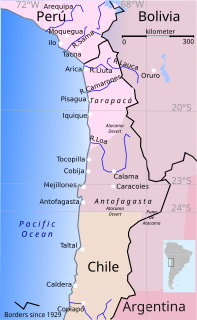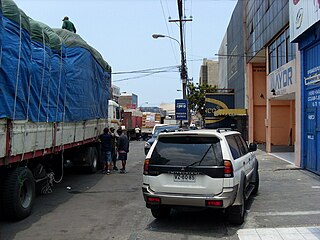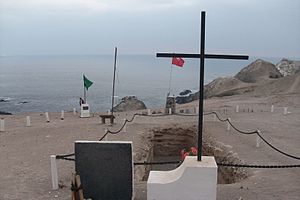
The War of the Pacific, also known as the Saltpeter War and by multiple other names, was a war between Chile and a Bolivian–Peruvian alliance from 1879 to 1884. Fought over Chilean claims on coastal Bolivian territory in the Atacama Desert, the war ended with a Chilean victory, which gained for the country a significant amount of resource-rich territory from Peru and Bolivia. The Chilean Army took Bolivia's nitrate-rich coastal region, and Peru was defeated by the Chilean Navy.

Inti-Illimani are an instrumental and vocal Latin American folk music ensemble from Chile. The band was formed in 1967 by a group of university students and it acquired widespread popularity in Chile for their song Venceremos, which became the anthem of the Popular Unity government of Salvador Allende. At the moment of the 11 September, 1973 Chilean coup they were on tour in Europe and were unable to return to their country where their music was proscribed by the ruling military junta of Augusto Pinochet. In Europe their music took on a multifarious character, incorporating elements of European baroque and other traditional music forms to their rich and colourful Latin American rhythms, so creating a distinctive fusion of modern world music. They are perhaps the best internationally known members of the Nueva canción movement. Their name means 'Sun of the Illimani': Illimani, in Aymara language, is the name of a mountain in the Bolivian Andes and it means 'Golden Eagle'.

The Battle of Pisagua, was a landing operation of the War of the Pacific, fought on November 2, 1879, between Chile and the combined forces of Bolivia and Peru. The Chilean army commanded by Erasmo Escala, supported by the Chilean Fleet, launched an amphibious assault on the port of Pisagua and successfully drove the defending Bolivian-Peruvian forces, led by Gen. Juan Buendia, back from the shore. They established a beachhead that allowed an initial force of about 1,000 Chilean soldiers in two assault waves to disembark onto Peruvian territory at Pisagua in Tarapacá Department. This region was the principal territory in dispute.

The Battle of San Francisco, also known as the Battle of Dolores, was a major battle in the Tarapacá Campaign of the War of the Pacific, fought on November 19, 1879, in the Peruvian department of Tarapacá. A Chilean army under Colonel Emilio Sotomayor had moved via Dolores rail road deep into the desert and was encamped at San Francisco Saltpeter Office, about 30 kilometers south east of the port of Pisagua. Allied forces under General Juan Buendía launched an attack on Sotomayor's army. At the beginning, Bolivian General Carlos Villegas pressed the attack over a poorly defended battery right in the Chilean centre and almost succeeded. Only the arrival of infantry support allowed Colonel José Domingo Amunátegui to hold the position.

Curicó Unido is a football club based in Curicó, Maule Region, Chile. They currently play in the Primera División, the first level of the Chilean football system. They are currently managed by Martín Palermo.

The Santa María School massacre was a massacre of striking workers, mostly saltpeter works (nitrate) miners, along with wives and children, committed by the Chilean Army in Iquique, Chile on December 21, 1907. The number of victims is undetermined but is estimated to be over 2,000. It occurred during the peak of the nitrate mining era, which coincided with the Parliamentary Period in Chilean political history (1891–1925). With the massacre and an ensuing reign of terror, not only was the strike broken, but the workers' movement was thrown into limbo for over a decade. For decades afterward there was official suppression of knowledge of the incident, but in 2007 the government conducted a highly publicized commemoration of its centenary, including an official national day of mourning and the reinterment of the victims' remains.
English Chileans are citizens of Chile who are descended from English people who have emigrated. They are estimated to number 550,000-820.000.

The following is an alphabetical list of articles related to the Republic of Chile.

José Gregorio Liendo Vera, also known as "Compañero Pepe", "Comandante Pepe" or "Loco Pepe" was a Chilean university student, political leader and militant of the Revolutionary Left Movement, a Marxist-Leninist and Guevarist urban guerrilla and political movement, being also leader and member of the "Movimiento Campesino Revolucionario" (MCR), the MIR's Front of the Masses among the Chilean peasentry, participated in the fundos occupations during the government democratically elected socialist President Salvador Allende and the leftist political coalition Unidad Popular in the early 1970s.

The Pisagua internment camp was a concentration camp in Pisagua, Chile.

The Zona Franca de Iquique, known by the acronym Zofri, is located in the coastal port city of Iquique, in Iquique Province of the Tarapacá Region, northwestern Chile.

The Clock Tower is a National Historic Landmark located in Plaza Arturo Prat in Iquique, Chile. It was built in 1878, with the mechanism imported from England.

The Tarapacá campaign is a short stage of the War of the Pacific developed in the last months of 1879, after the Chileans won definitive naval superiority at Angamos, and takes its name from the region where it was fought.

El camionero, is a Chilean television series that aired on TVN and TV Chile from August 15, 2016, to March 14, 2017, starring Marcelo Alonso, María Elena Swett, Pablo Cerda, and Angie Jibaja.

Wena profe is a Chilean telenovela premiered on Televisión Nacional de Chile on September 25, 2017, and concluded on May 11, 2018. The series is written by Carlos Galofré, along with Luis López-Aliaga, Rodrigo Ossandón and Francisca Fuenzalida. It stars Marcelo Alonso and María Elena Swett as the titular's character.














